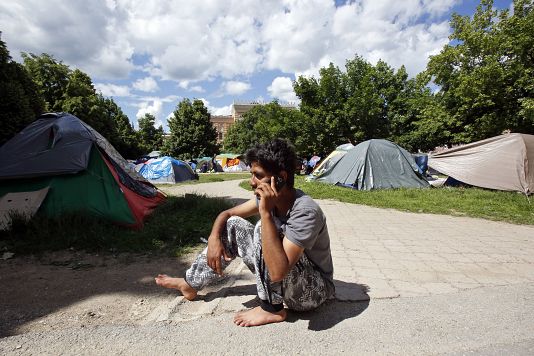For some, World Day Without Mobile Phones is a chance to forgo a luxury. For others, smartphones are a means of survival.
This weekend marks World Day Without Mobile Phones — an event highlighting the benefits of digital 'detoxification' — but for migrants and refugees, smartphones are an indispensible tool for life.
Daouda is an asylum seeker in Lyon. His main use of a smartphone is to locate prefectures or asylum reception centres, such as Forum Refugiés. "It is important because I do not know the city," he told Euronews.
It was in a mobile phone store that he was advised to use a Lycamobile chip, an operator among those widely used by migrants.
"The smartphone is easier than asking people for directions. Some refuse to answer or others send me to the wrong place. With GPS, you are fine."
Daouda uses IMO — voice over IP (VOIP) application that allows users to make audio or video calls — to stay in touch with his wife.
Lyon is also the home city of Alpil, an association supporting "people in great difficulty with housing or accommodation". Coline Goosens works as a project manager and told Euronews that a large part of the public she welcomes "no longer uses a computer, for various reasons: they cannot afford it, are hosted by third parties, in squats or in precarious housing."
Smartphones then become the most favorite tool for administrative procedures, but also for being in contact with social landlords, lawyers, mentoring associations or social workers. Migrants also use them to scan administrative documents.
How migrants and refugees can use smartphones
Katja Kaufman is a post-doctorate specialist in mobile technology use at the University of Innsbruck in Austria. She studied the use of mobile phones by Syrian refugees in Vienna in 2018.
As refugees, they must both "navigate and establish themselves in a foreign environment while being constantly engaged in a multitude of transnational digital conversations with family, friends and home communities," she explains.
In interviews with refugees, she asked them to name the five apps that matter most to them. Facebook, WhatsApp, the Viennese application for public transport, Google Maps and Google Translate were those often quoted.
Kaufman also noted that "among the approximately 90 different applications and functions mentioned, none had been specifically designed for immigrants or refugees."
The study classifies their uses in four categories:
To orient yourself geographically: the smartphone GPS has "proved to be extremely useful in the difficult situation combining the lack of local knowledge and the lack of command of the language". Even if this implies fewer interactions with people.
To learn the language and for daily translations: via translating services or online dictionaries and video tutorials.
To access information and assistance services, whether to follow the news or find some information necessary to navigate in their new environment.
To keep in touch with family at home, so much so that "being online on messaging applications such as WhatsApp is considered by the family as synonymous with physical well-being," Kaufman noted. Therefore, most of the people interviewed in the study said that they never signed out.
Smartphones not always the best answer
Transactions without a phone number or email address are practically impossible, explained Goosens. But there is a perverse effect: "It becomes complicated to do additional tasks using another medium, on computers in particular, because identifiers and passwords are saved in their phone."
The situation can become more critical when phones are stolen, as it is "their only tool for the administrative procedures and it contains all their personal information."
The uses — often crucial, sometimes vital — are not without consequences. The refugees interviewed by Kaufman in Vienna have developed, according to the study, "not only a strong emotional attachment to their smartphones, but also a technical and material dependence."
Almost all have a charger with them at all times. Mouhamad, one of the Syrians questioned explains: "I could not imagine life here without a smartphone ... there is nothing to use as an alternative."
Euronews has also contacted Dr Isabel Awad, associate professor at the Erasmus University of Rotterdam. In a study she compiled, Syrian refugees discuss the limits of the concept of "connected refugees," when it comes to integrating themselves, finding a job and so on.
Constant contact with home create a feeling of helplessness in the new country, or even distress among migrants in Europe.
One of the Syrians who took part in the study explained: "It is very painful to communicate with my family because you have the same story, the same story of despair."
For another: "I am talking to my family and the news still looks like 'Uh ... this person was killed, this person was kidnapped.'"
Awad explained to Euronews that she wanted to explore beyond the discourse of smartphones as a useful "survival tool" for migrants, and was also responding to anti-migrant tropes that see smartphones as a luxury item that somehow undermine their claims of asylum.












